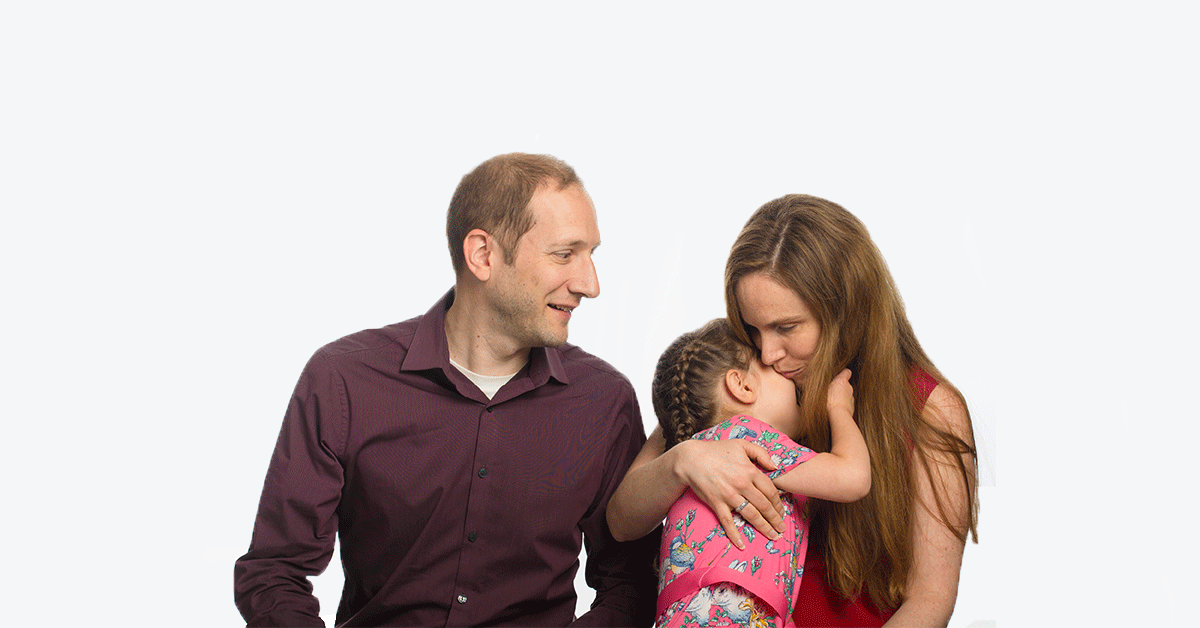Are you wondering when and how to talk to your daughter about her Fragile X syndrome diagnosis? If so, you’re not alone. Many families struggle with deciding when the “right” time is and what to say. Here are some strategies to help in having a conversation with your daughter about her Fragile X syndrome diagnosis.
What Does it Mean to Have Fragile X?
Every family has something that makes them unique. In your family, that’s having a daughter (and maybe other family members) with Fragile X syndrome. Fragile X is something people are born with, and there’s nothing they or their family did to cause it.
Having Fragile X syndrome means that your daughter may face additional challenges during school in areas such as reading and math, and may feel uncomfortable in social settings. But this doesn’t mean she can’t achieve what she sets her mind to: she just may need extra help and support.
Fragile X syndrome is not something she’ll “grow out of” but it does make up a part of who she is. Kids with Fragile X are still kids. They like to run around, play, and laugh. Having Fragile X does not affect their ability to have a long, happy, and healthy life full of possibilities.
Everyone faces different challenges in their lives. While Fragile X may make life a little more challenging, it also makes life much more special.
When is the Right Time?
There is no right or wrong time to talk with your daughter about her diagnosis. Consider starting the conversation earlier rather than later so she may continually learn more about Fragile X as she gets older, rather than try to absorb a lot of new information all at once.
As a parent, you may feel an instinct to protect your child from harm, stigma, and stress by delaying talking about her diagnosis. However, research shows that children wish to discuss this information as soon as possible. This reduces anxiety and increases trust in their caregivers. Children would also rather hear this information from someone they know and trust.
Children are more observant than you think. Often, as children get older they begin to compare themselves to their peers. The time may be right when your daughter starts to question why it takes her longer to learn topics in school compared to her classmates, or why she sees the doctor so often. She may bring up the conversation before you are ready or had time to fully prepare.
Consider thinking about this conversation before you even plan to open the dialogue, just in case. It’s okay to be nervous about how your daughter will react. Learning about her diagnosis may allow her to understand why she struggles with certain things and why she may need extra help and support in school.
This is an Ongoing Conversation
Knowing exactly what to say is difficult, so ask yourself: what does my child need to know now and how much can my child handle? Consider starting a natural conversation in a relaxed, open, and familiar environment such as the dinner table or on a walk. Scheduling a specific time or event with your child to talk to them could increase their anxiety. Allow your child to direct you in how much information they wish to know. This is not a one-sided lecture, encourage them to ask questions and allow ample time for discussion.
This is not a discussion that should happen in a single sitting. Over time, peel back the layers of FXS by incorporating bits and pieces of information into everyday discussions. A young child can’t understand all of the information about their diagnosis at once, so deciding what they need to know at each stage of their life is crucial.
The initial conversation should focus on what Fragile X is and how Fragile X syndrome may impact her life. Keep your conversation simple and matter of fact.
Children are curious and your daughter will ask you if she wants to know more. Try not to focus on the “negatives” of Fragile X. It’s important for your daughter to know why she may struggle with reading, math, or when talking to strangers, but let her know that her family, teachers, and doctors are there to support her in succeeding and reaching her goals. It’s also important to emphasize that everyone has strengths and weaknesses regardless of Fragile X syndrome. While certain aspects of school may be challenging, make a point to emphasize what she excels at.
Over time and at the appropriate developmental or life stages, gradually add more to the conversation and let her know what her life may look like going forward. Let her know that she is supported, and that you will work hard with your daughter so that she can gain the skills she’ll need throughout her life. It’s important to be open and honest. Also, allow for open conversations and invite her to ask questions. If you’re not sure of the answer, take the time to sit down together to learn the answer together. This can be a great bonding experience and demonstrates that you’re willing to learn alongside her.
Your daughter is not alone. There are other girls out there with Fragile X syndrome. Consider going to a conference or other event so your daughter can meet other girls with Fragile X syndrome.
Remember, you’re not alone either. Other families have been in the same position as you. Seek out advice from parent and family support groups or forums to gain perspectives on how this conversation went with their own daughters. Ask for suggestions and explore what challenges they faced.
Key Takeaways
- This conversation does not have to be one-time; it’s an ongoing discussion targeted toward the appropriate developmental stage of your daughter. Studies have shown that children prefer to learn about their condition gradually throughout childhood and adolescence.
- Allow for open and honest communication and encourage questions.
- Remind your daughter that she is unique, supported, and loved.
- The way that each girl experiences Fragile X is different. Ultimately, you are the expert on your daughter and know the right amount of information to provide at a given time.
Additional Resources
Explaining Learning Disabilities to Your Child
It’s important to take this opportunity to create an open and honest dialogue. While every student is different, there are steps you can take to make this conversation more comfortable and helpful. (Source: Churchill Center & School)
How to Help Kids Talk About Learning Disabilities
If your child has a learning disability, getting them help is the first thing on your mind. Helping them get comfortable talking about it is also important, but for a lot of kids, opening up isn’t as easy as it sounds. (Source: Child Mind Institute)
Moms: How to Talk to Your Child About Their Disability
While it may be seen as an intimidating conversation, it can be very helpful for the child, and it will make them understand their world a little bit more. (Source: Smart Kids with Learning Disabilities)
Smart Kids with Learning Disabilities: Educating Your Child About LD
How and when to tell your child about her learning disabilities depends on your readiness as well as theirs and the “right time” is sooner rather than later. (Source: Smart Kids with Learning Disabilities)






